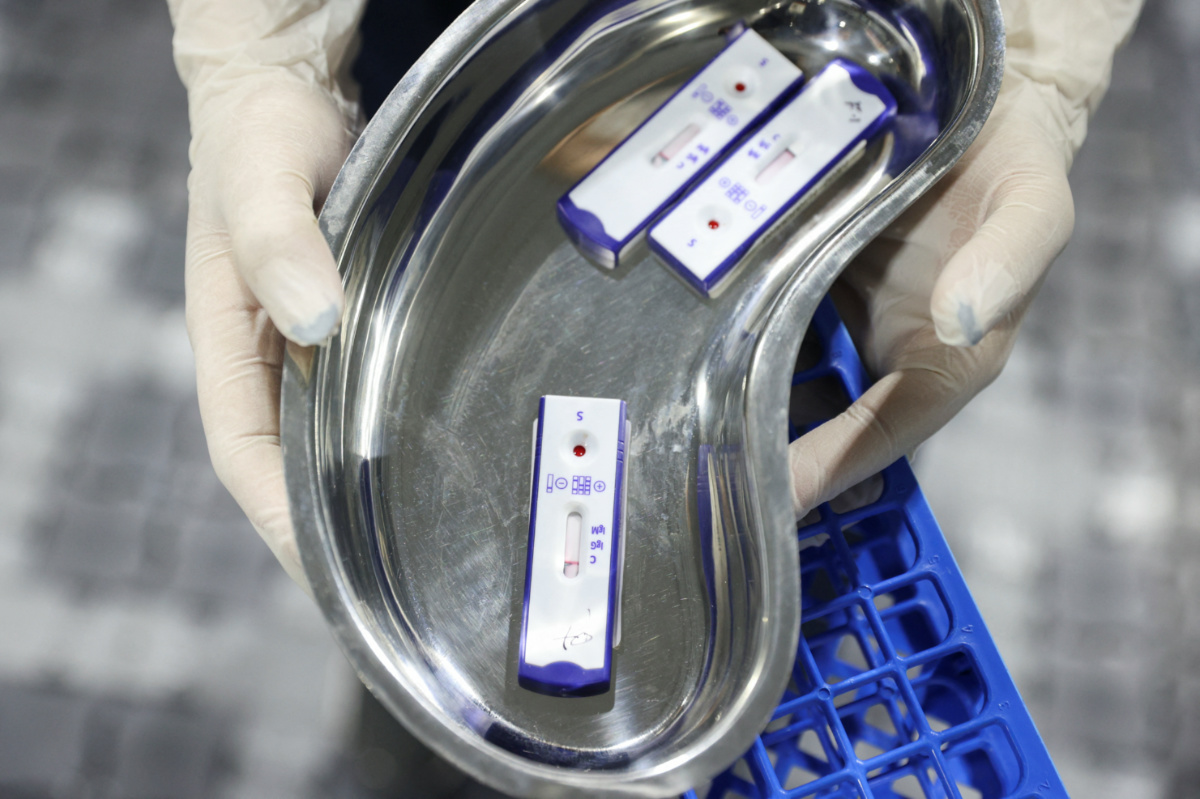Sydney, Australia
Reuters
Australia recorded another record surge in COVID-19 infections on Tuesday as an outbreak of the highly infectious Omicron variant disrupted reopening of the economy, while state leaders argued over domestic border controls.
The country reported 10,269 new cases of the coronavirus in the previous day, according to a Reuters calculation of state figures, once again surpassing its peak of a day earlier, as it grapples with a planned reopening while the new variant rages.
The state of South Australia, which has been experiencing a flare-up, was yet to report its latest numbers.

A medical worker holds a tray containing antibody blood tests at a pre-departure coronavirus disease (COVID-19) testing facility, as countries react to the new coronavirus Omicron variant, outside the international terminal at Sydney Airport in Sydney, Australia, on 29th November. PICTURE: Reuters/Loren Elliott/File photo.
There were five COVID-19 deaths reported, taking the total fatalities to just over 2,200 since the start of the pandemic. Authorities did not specify whether any of the new deaths were related to the Omicron variant.
The Omicron variant, which medical experts say is more transmissible but less virulent than previous strains, began to spread in Australia just as the country got underway with plans to reopen for good after nearly two years of stop-start lockdowns.
With the resumption of rising case numbers – despite a vaccination rate of more than 90 per cent for Australians aged over 16 – the country’s state leaders have brought back some containment measures like mandatory mask-wearing and QR code check-ins at public venues.
The rising case numbers have also led to mandatory self-isolation for thousands of workers in the hospitality, entertainment and airline sectors – the sectors worst hit by lockdowns – resulting in cancelled theatre shows, closed restaurants and postponed flights.
The outbreak has also fuelled a resumption of fractious domestic politics which defined much of the pandemic as some states resist calls to remove internal border controls.
New South Wales, home to Sydney and a third of Australia’s 25 million population, called on neighbouring Queensland to shift from mandatory clinical testing at the point of origin to on-the-spot rapid antigen testing for people travelling there.
NSW Health Minister Brad Hazzard said a quarter of clinical tests in his state were “tourism tests” for asymptomatic people, bringing huge pressure of the health system, long testing queues and wait times of several days for results.
In one case, a Sydney testing clinic sent incorrect negative test results to 400 COVID-positive people, then prematurely sent 950 people negative results when 486 were actually positive. The bungle was the result of “human error, and when people are under pressure, human errors are more frequent”, said Hazzard.
He called on Queensland to scrap mandatory clinical tests immediately, rather than after 1st January as planned, but the Queensland authorities said the policy was working.
Queensland Health Minister Yvette D’Ath instead said the state would remove another testing rule for interstate arrivals: people arriving in the state would no longer have to take a virus test five days after arriving.
Australia’s international border remains effectively closed, but Australian nationals may return without mandatory hotel quarantine and the country has said it would allow certain skilled workers and foreign students in.






